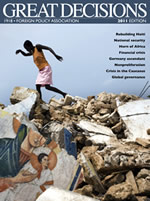Rebuilding Haiti
The January 2010 earthquake that devastated Haiti struck a country already suffering from widespread poverty and underdevelopment. Did this natural disaster inadvertently provide an opportunity for reassessment and planning a new Haiti? Will the results of the 2010 presidential elections provide the leadership bring to restore the country?
U.S. National Security
U.S. national security priorities were expanded after the terrorist attacks of September 11, 2001, to include waging war in Iraq and Afghanistan, tightening border security, pursuing cyberthreats, halting nuclear proliferation and attempting to snuff out homegrown terrorism. How has the U.S. national security agenda evolved since 9/11? In what ways will this agenda shape the American way of life in the future?
Horn of Africa
Since the early 1990s, the U.S. has monitored the Horn of Africa due to security concerns. Internal instability, weak governments in some countries, regional rivalries and a lack of development have resulted in an environment conducive to terrorism. Can the U.S. protect its national interests while mitigating the dangerous conditions in the region?
Responding to the Financial Crisis
As an immediate response to the financial crisis of 2007–08, governments around the world stepped in to bail out troubled private banks deemed “too big to fail,” underscoring the interdependence between private and public finances. With the recent eurozone crisis, what have we learned so far and is it possible to ensure that future crises will not occur?
Germany Ascendant
Germany has emerged from both the financial crisis and the eurozone crisis as the dominant economic and political power in Europe, in particular setting the tone for dealings with Russia, Eastern Europe and Iran. How important is it for U.S, interests to enhance relations with Germany, and how should the U.S. react when German and U.S. interests fail to align?
Sanctions and Nonproliferation
Sanctions have been created to curb nations in violation of international law, especially agreements concerning nuclear nonproliferation. How successfully have sanctions been applied against past violators? Is there any chance sanctions can curtail North Korea and Iran from continuing to develop nuclear weapons?
The Caucasus
The countries and regions of the Caucasus all have strong national identities but have long lived in the shadow of their larger neighbors: Russia, Iran and Turkey. How does this influence the Caucasus of today? How do the region's energy resources play into its relations with the outside world?
Global Governance
International cooperation subjects political leaders to an ongoing test: balancing national needs with a commitment to building a durable international order. How has an increasingly interconnected and shrinking world affected the viability of existing agreements and institutions? What economic, social, political and security concerns are currently on the agendas of intergovernmental bodies, and what is the future U.S. role?






